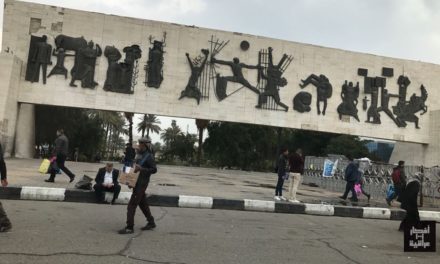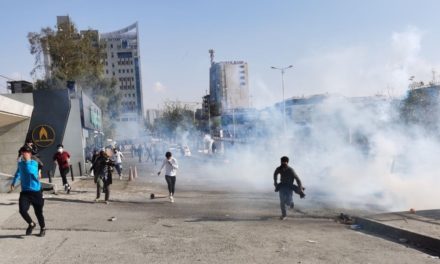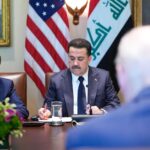(Iraq-Syria border crossing/Photo: AFP)
Since 2011, the Middle East has witnessed severe crises and conflicts, most notably the uprising in Syria, which led to a long and bloody civil war. The repercussions of this conflict were not confined to just Syria but extended to neighboring countries, particularly Iraq. There was political, economic, social, and military spillover into Iraq — resulting in the war against ISIS/Da’ish. While Iraq worked with allies to territorially defeat ISIS, Iraq was simultaneously active in regional dialogues and international conferences advocating for intra-Syrian solution that maintains Syria’s territorial integrity and sovereignty.
Iraq’s foreign policy is built on a set of core principles that define its priorities in addressing regional crises, which emphasizes “non-interference in the internal affairs of other nations”. Iraq seeks to uphold its sovereignty and that of others, avoiding alignment with any specific party in conflicts. Instead, it focuses on fostering balanced and friendly relations with neighboring countries to prevent tensions and ensure regional security. Central to this approach is Iraq’s reliance on diplomatic dialogue as a primary tool for resolving regional crises, whether it involves border disputes or complex political issues.
In the past Iraq was caught in the crosshairs of a regional conflict involving multiple state and non-state actors. Today, that is not the case as Iraq prevented any group from being involved in the latest developments in Syria that led to the fall of the Assad regime. This marks an important milestone in Iraq’s regional policy, showcasing its ability to play an effective role in managing surrounding crises in a manner that supports its internal stability and strategic interests. Iraq has worked to strengthen dialogue channels with all influential parties involved in the Syrian conflict, leveraging its geographic location and strong relationships with various regional and international powers to advocate for peaceful solutions through political mediation.
Given the challenges posed by the Syrian crisis, such as the infiltration of terrorist elements and arms smuggling, Iraq has bolstered control over its borders with Syria, to reduce the crisis’s security impact on its territory. Iraq has coordinated with regional and international powers, including Russia and the United States, as well as neighboring countries like Iran and Turkey, to act as a mediator and promote stability along its borders and in the broader region. This approach underscores Iraq’s ability to prioritize its national interests independently of regional alignments.
Stopping any spillover from Syria this time around will enhance Iraq’s position as a key player in the Middle East. This success lays the groundwork for Iraq to assume a more active role in resolving future regional crises. Domestically, Iraq has fostered a unified stance among political parties and blocs on the importance of protecting its borders and refraining from direct involvement in Syria’s crisis while supporting the Syrian people’s aspirations to determine their political future.
The Syrian conflict serves as a living example of how regional crises can impact neighboring countries. Achieving stability in Syria remains a critical necessity—not only for Syria but also for Iraq and the entire region. This requires a shared vision and comprehensive solutions to address the root causes of the conflict and its far-reaching effects. Iraqi Deputy Prime Minister and Foreign Minister Fuad Hussein has emphasized the importance of the Syrian situation to all Iraqis, noting that political and security stability in Syria is integral to Iraq’s stability.
The Foreign Minister reiterated Iraq’s commitment to a set of principles regarding Syria’s political process, which includes the establishment of a democratic system through dialogue that represents all Syrian communities and respects human rights and women’s rights. Moreover, Iraq has stressed the need for a Syrian-led transitional phase with support from regional and international players to facilitate a clear political process that guarantees citizens’ rights and avoids exclusionary policies targeting national, sectarian, or religious groups.
The fall of Bashar Al-Assad’s regime in Syria will bring about significant political, security, and social changes in the region. However, the continued impact of the Syrian crisis and its regional repercussions requires managing relationships with international powers involved in Syria while avoiding alignment with one party at the expense of others. If a stable political system is not established, chaos will ensue, potentially allowing extremist groups to fill the power vacuum, which poses a threat to the stability of neighboring countries.
To ensure a more effective role in addressing regional crises, Iraq must enhance its diplomatic institutions to better engage in mediation efforts and focus on building regional alliances that serve its interests and those of the region. Additionally, Iraq should develop its economic policies to strengthen its soft power within the region.

Aymen Al-Faisal
Aymen Al-Faisal is a researcher and academic interested in political affairs. The opinions expressed in this piece are his own.










